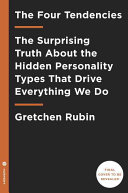2018 School Spending Survey Report
The Four Tendencies: The Indispensable Personality Profiles That Reveal How To Make Your Life Better (and Other People's Lives Better, Too)
Harmony: Crown. Sept. 2017. 272p. notes. ISBN 9781524760915. $24; ebk. ISBN 9781524760922. PSYCH
COPY ISBN
 Rubin (The Happiness Project; Better Than Before) here expands on an idea she began exploring in her earlier books, that you gain tremendous self-knowledge by examining how you respond to expectations (both internal and external). Obligers, for instance, respond well to outer expectations but have trouble meeting inner ones. Therefore, people with that tendency benefit from having an exercise partner or building other accountability checks into their routines. After discussion of the different tendencies and why it's helpful to understand them, Rubin explains—with a quiz—how to figure out your tendency and that of others, how to understand and work with people whose tendencies are different from your own, and how to harness strengths in order to accomplish goals. It's a clever system, charmingly and convincingly explained.
Rubin (The Happiness Project; Better Than Before) here expands on an idea she began exploring in her earlier books, that you gain tremendous self-knowledge by examining how you respond to expectations (both internal and external). Obligers, for instance, respond well to outer expectations but have trouble meeting inner ones. Therefore, people with that tendency benefit from having an exercise partner or building other accountability checks into their routines. After discussion of the different tendencies and why it's helpful to understand them, Rubin explains—with a quiz—how to figure out your tendency and that of others, how to understand and work with people whose tendencies are different from your own, and how to harness strengths in order to accomplish goals. It's a clever system, charmingly and convincingly explained.
VERDICT This will be of particular interest to those responsible for motivating others (e.g., managers or parents) but also enjoyed by anyone fascinated by human nature. (See the Q&A with the author on p. 107).
RELATED
ALREADY A SUBSCRIBER? LOG IN
We are currently offering this content for free. Sign up now to activate your personal profile, where you can save articles for future viewing




Comment Policy:
Comment should not be empty !!!